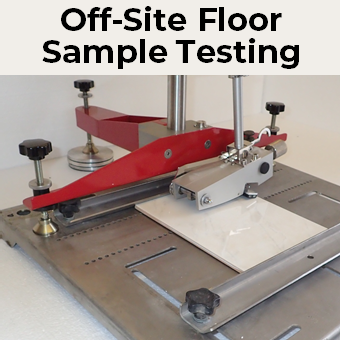About the Floor Slip Resistance Testing
► What is Floor Slip Testing?
Floor Slip Resistance Testing is using Specialist Pendulum Floor Testing Equipment to Ensure a Safe Floor Surface for businesses and also used to Test Floors in Slip Injury Accident Claims.
Why Test Floors?
Every UK business or organisation has a Legal Duty of Care to Provide Safe Floors for Employees, Guests, Customers and Members.
How Do I Test Floors?
This most accepted method used in the UK to test floors and endorsed by the UK HSE and well recognised by UK Courts in Expert Witness cases of Slip Injury Claims is the Floor Pendulum Test, with floor tests conducted to meet Pedestrian Floor Testing Standard EN-16165* using UKSRG Guidelines; both protocols decreed by the UK HSE as the most suitable to test floors.
*Replacing BS-7976-2
FloorSlip offer two prime options for Pendulum Testing: -
On-Site Pendulum Floor Slip Resistance Test
The On-Site Floor Slip Resistance Pendulum Testing conducted across the UK is used for three prime reasons: -
- To Test Floors as part of Floor Safety Risk Assessments
- To Test Floors by architects, builders and the like when commissioning / specifying new floors in new-builds or renovations
- In the event of Slip Injury Claims; the pendulum floor test the prime recognised test method
Off-Site 'Floor Sample' Pendulum Testing
Off-Site Floor Sample Testing gives affordable advance notice to architects, councils and floor specifiers etc. whether a floor will be suitable to fit as a safe floor. It is also suitable for businesses conducting floor safety risk assessments on floors in situ if a small sample can be removed from a floor (e.g., a floor tile or a piece of vinyl; minimum 150x150mm)
Floor Surface Roughness Testing
The Floor Surface Roughness Testing is used for Monitoring Floor Wear over time. It is also used as part of the On-Site Pendulum Testing (discussed above). The equipment works by measuring the peaks and troughs of the floor surface at a microscopic level to give the Rz Value (micrometres).
.png)
Floor Ramp Testing / R-Ratings / ABC Ratings
FLOORSLIP DO NOT OFFER RAMP TESTING BUT WE CAN ADVISE WHO CAN DO IT FOR YOU - PLEASE CONTACT US
Floor Ramp Testing, under DIN Standards (expected to be fully replaced by EN-16165) determines Floor R-Ratings* (Shod Environments) and Floor ABC Ratings* (Bare-Foot Environments). It is a specialised and generally expensive test used for the purpose of a business wanting to specify a floor surface, which will be safe to use when a particular boot or shoe is worn and with a specific floor contaminant, generally oil in a specific location. It is not meant for GENERIC EVERDAY floor specification.
*NOTE WELL - R-RATINGS SHOULD NOT BE USED FOR THE PURPOSE OF SPECIFYING GENERAL FLOORING AND THERE IS NO READ-ACROSS FROM R-RATINGS TO PTV (Pendulum Test Value).
The best way to check if a floor can meet the required legal UK/HSE standards for floor safety is by the Floor Pendulum Tests discussed above
Other Floor Testing Methods
FloorSlip do not use any other methods than those prescribed by the UK HSE, which is the Floor Pendulum Test to check for Slippery Floors. This is to ensure consistency to meet Pedestrian Floor Testing Standard EN-16165 and UKSRG Guidelines and to deliver acceptable test evidence in UK Courts in Slip Injury Claims.
Want to know more about Floor Testing?
Browse our site (Try the OUR SERVICES Page), or try our Frequently Asked Questions (FAQ's), or Contact FloorSlip if you want to learn more pursuing floor testing for your business or in Making a Slip Injury Claim

.png)
.png)

.png)
.png)
.png)